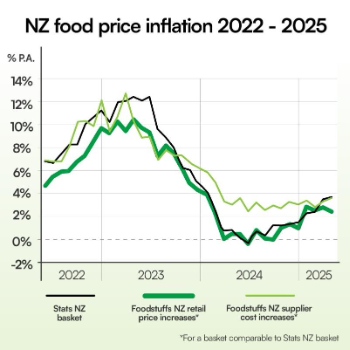Global supply constraints for dairy, beef and cocoa continue to drive NZ’s food price inflation rate

• Stats NZ records 3.7% annual food price inflation (FPI) in April 2025
• Foodstuffs co-ops see their retail prices rise 2.4% YOY for comparable FPI basket of products
• April’s FPI rate driven by global prices for dairy, beef and cocoa products
• Survey finds 54% of shoppers understand higher supplier costs affect food prices
Latest statistics show global supply constraints for three popular commodities are still playing a key role in New Zealand’s food price inflation rate.
Stats NZ has reported an annual food price inflation (FPI) rate of 3.7% in April, while the Foodstuff co-ops recorded an average 2.4% year-on-year rate for their comparable FPI basket of products.
The two co-ops have been monitoring the pace of retail price and supplier cost increases at their stores since 2022, based on a basket of goods in the same categories Stats NZ monitors, using the same methodology and weightings.
Key drivers of their 2.4% retail price rate in April, year-on-year, were increases of 65% for butter, 27% for drinking chocolate, 23% for chocolate blocks, 20% for beef steak and 14% for cheese – five products that collectively accounted for over half the co-ops’ overall retail price increase.
Foodstuffs NZ Managing Director Chris Quin says prices for dairy, beef and cocoa are still near record levels on global markets, as falling or static supplies can’t meet consumer demand.
“All three commodities have been impacted by a range of factors affecting farmers worldwide in recent years, including extreme weather, land-use changes and elevated input costs,” says Quin.
“The global constraints for dairy and beef mean New Zealand’s products are in high demand, and earn a premium due to their quality, which is good for our farmers but less so for shoppers.”
April’s price increases were mitigated by a -3.3% average decrease for fruit and veggies in the FPI basket, including year-on-year price falls of -25% for red capsicums and -23% for avocadoes.
Retail prices were again outpaced by supplier costs, with an average 3.6% rise in what suppliers charged for goods in the FPI basket. Earlier this week, Infometrics reported a 2.0% increase in the Grocery Supplier Cost Index, which monitors the cost of 60,000 goods the co-ops stock.
Quin says Foodstuffs’ latest quarterly survey of over 1,800 shoppers found most understand that higher supplier costs are having an impact at the checkout.
“When asked what factors may have contributed to food price inflation in the last six months, 54% pointed to rising supplier costs, which account for roughly two-thirds of the retail shelf price, while 38% acknowledged the impact of high international import costs.
“At Foodstuffs we think it’s important shoppers are fully informed of all the factors driving prices, including the role played by the small group of multinationals who supply many of the groceries we sell on a regular basis, and enjoy a high degree of market power.
“Our co-ops were formed specifically so small grocers could get good deals from big suppliers. More than a century on, New Zealand still needs a strong 100% locally-owned grocer who can keep buying well on global markets in spite of any supply constraints."
